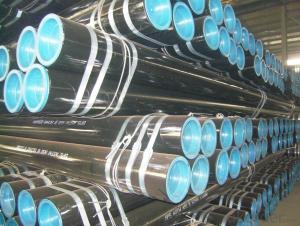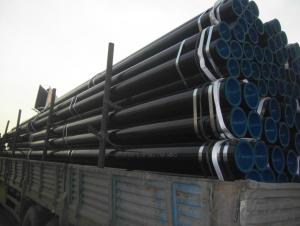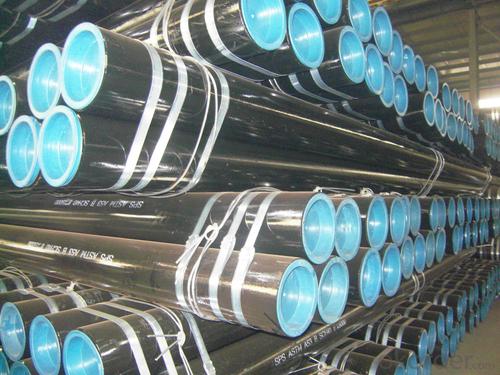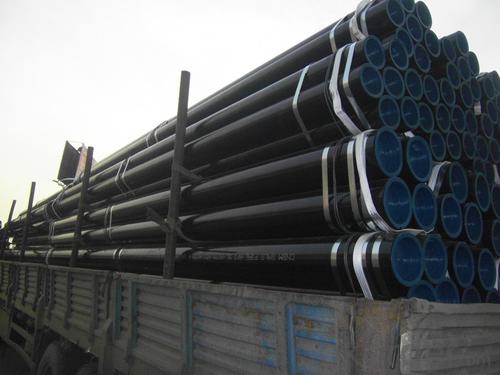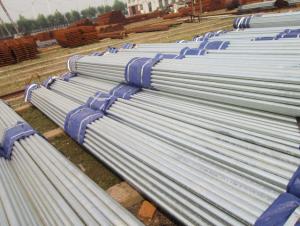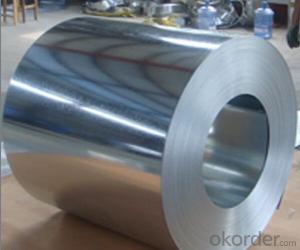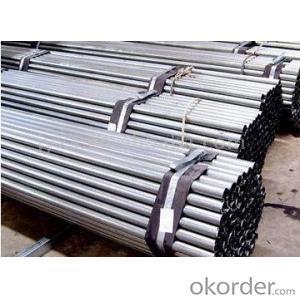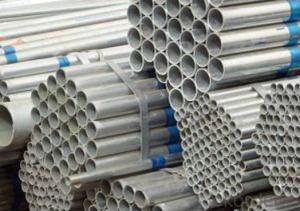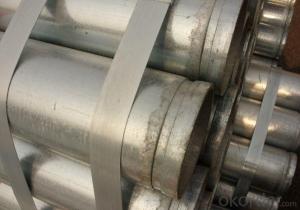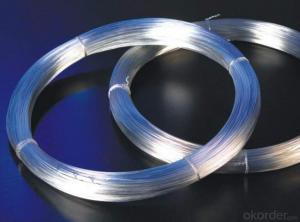Top Supplier of Seamless Steel Pipe with high quality
- Loading Port:
- Shanghai
- Payment Terms:
- TT OR LC
- Min Order Qty:
- 50 m.t.
- Supply Capability:
- 10000 m.t./month
OKorder Service Pledge
OKorder Financial Service
You Might Also Like
Quick Details
| Thickness: | 1 - 80 mm | Section Shape: | Round | Outer Diameter: | 0.25 - 16 inch |
| Place of Origin: | Shandong China (Mainland) | Secondary Or Not: | Non-secondary | Application: | Fluid Pipe |
| Technique: | Hot Rolled,hot rolled and cold drawn | Certification: | API | Surface Treatment: | painted |
| Special Pipe: | API Pipe | Alloy Or Not: | Non-alloy | model number: | ASTM A106-B |
| usage: | mechanical or fluid | WT: | 1mm to 80mm | OD: | 10mm to 406mm |
| surface: | black painted | Grade: | 10#,20#,15CrMo,35CrMo4,30CrMo,16Mn,A53(A,B),A106(B,C),API J55,API K55,St52,St52.4,STPG42,Q345,10#-45#,Cr-Mo alloy,A53-A369,API J55-API P110,ST35-ST52,Q195-Q345 | Standard: | BS 3059-2,JIS G3454-2007,JIS G3455-2005,JIS G3452-2004,GB 3087-1999,GB/T 8163-1999,DIN 17175,ASTM A53-2007,API 5CT,BS,JIS,GB,DIN,ASTM,API |
Packaging & Delivery
| Packaging Detail: | Packing: In bundles, Varnish coating, Ends can be bevelled or square cut, End capped |
| Delivery Detail: | Depends on your order quantity. |
Specifications
1.Seamless pipe professor
2.MTC,ISO,API certificate
3.ASTM,DIN,BS,JIS
4.On time delivery
5.Big store,excellent package.
Liaocheng Tongyun Pipe Industry Co.,Ltd-- Seamless Steel Pipe Professor
1.Our pipe size
OD: 1/8'' to 16'', nomical thickness :Sch5s to XXS
OD 14mm to 325mm, wall thickness: 1mm to 80mm
Also we can produce expand pipe from 20'' to 24''
2.Our pipe including:
ASTM A106 seamless carbon steel pipe
Structure steel pipe
ASTM A179 cold drawn low carbon steel pipe
ASTM A192 steel boiler tubes
ASTM SA213/A519 alloy steel pipe
DIN1629/EN10216-1 Pipe line
DIN17175/EN10216-2 Heat Resisting seamless steel pipe lines
DIN 2391-1 cold drawn or cold rolled steel tube
API SPEC 5CT Tubing and Casing
Cylinders Steel Pipe
3.Package:
Bundle package
Bevelled end or plain end
Painting varnish coating
PVC covered and both ends capped
4.Min order: 10 metic tons.
5.Length: 12meters Max
- Q: Can steel pipes be used for structural supports?
- Yes, steel pipes can be used as structural supports due to their high strength, durability, and ability to withstand heavy loads. They are commonly used in construction for applications such as columns, beams, and braces, providing stability and support to various structures.
- Q: How do you cut steel pipes?
- Steel pipes can be cut using various methods such as using a hacksaw, reciprocating saw, angle grinder, or a pipe cutter. The choice of method depends on the thickness and diameter of the pipe, as well as the precision required for the cut.
- Q: What is the importance of corrosion resistance in steel pipes?
- The importance of corrosion resistance in steel pipes is significant as it helps to extend the lifespan of the pipes, ensures their structural integrity, and maintains the quality of the fluid or gas being transported. Corrosion can lead to pipe failures, leaks, and contamination of the contents, resulting in costly repairs, environmental hazards, and potential safety risks. Therefore, incorporating corrosion-resistant properties in steel pipes is crucial for their long-term performance, durability, and overall efficiency.
- Q: What are the different types of steel pipe joints?
- There are several different types of steel pipe joints, including threaded, welded, flanged, grooved, and compression joints.
- Q: Are steel pipes suitable for underground cable protection?
- Yes, steel pipes are suitable for underground cable protection. Steel pipes provide excellent mechanical strength and durability, protecting cables from external forces such as ground movement or accidental damage. They also offer resistance to corrosion, making them a reliable choice for long-term cable protection in underground installations.
- Q: What are the different types of steel pipe fittings for gas pipelines?
- There are several types of steel pipe fittings commonly used for gas pipelines, including elbows, tees, reducers, couplings, flanges, and valves. These fittings are essential for connecting and controlling the flow of gas within the pipeline system.
- Q: What is the hardness of steel pipes?
- The hardness of steel pipes can vary depending on the specific grade and manufacturing process. Generally, steel pipes are made from alloys that provide a combination of strength and toughness. To determine the hardness of steel pipes, various methods such as Rockwell or Brinell hardness tests can be conducted. These tests measure the resistance of the steel to indentation or penetration by a standardized indenter. The hardness of steel pipes is typically expressed as a numerical value on a scale, such as the Rockwell hardness scale (e.g., HRC or HRB) or the Brinell hardness scale (e.g., HB). The hardness of steel pipes is important as it indicates their ability to withstand physical stresses, such as pressure, impact, or wear, in various applications such as construction, oil and gas transportation, and manufacturing.
- Q: Can steel pipes be used for underground drainage?
- Yes, steel pipes can be used for underground drainage. Steel pipes are commonly used for drainage systems due to their durability, strength, and resistance to corrosion. They are able to withstand heavy loads and can be installed in various soil conditions. However, it is important to ensure proper coating and maintenance to prevent rusting and deterioration over time.
- Q: Are steel pipes suitable for high-pressure applications?
- Yes, steel pipes are suitable for high-pressure applications. Steel pipes are known for their strength and durability, making them ideal for handling high-pressure applications. They can withstand the internal pressure exerted by fluids or gases under high pressure without deforming or bursting. The high tensile strength of steel allows it to resist the forces that occur in high-pressure environments, ensuring the safety and reliability of the piping system. Additionally, steel pipes can be manufactured with thicker walls to further enhance their ability to withstand high pressures. Steel pipes are widely used in industries such as oil and gas, petrochemical, power generation, and water distribution, where high-pressure applications are common.
- Q: What are the different methods of protecting steel pipes from corrosion?
- There are several methods of protecting steel pipes from corrosion, including: 1. Coatings: Applying protective coatings such as epoxy, polyethylene, or zinc to the surface of the steel pipes can create a barrier against corrosive elements. 2. Cathodic Protection: This method involves installing sacrificial anodes or impressed current systems to provide a protective current that counteracts the corrosion process. 3. Corrosion Inhibitors: Adding chemicals or inhibitors to the fluid or environment surrounding the pipes can reduce the rate of corrosion. 4. Internal Linings: Applying internal linings made of resin, cement, or other materials can protect the inner surface of the pipes from corrosion caused by the transported fluid. 5. Design Considerations: Implementing proper design practices like avoiding sharp bends and crevices, ensuring proper drainage, and using corrosion-resistant alloys can help prevent corrosion in steel pipes.
Send your message to us
Top Supplier of Seamless Steel Pipe with high quality
- Loading Port:
- Shanghai
- Payment Terms:
- TT OR LC
- Min Order Qty:
- 50 m.t.
- Supply Capability:
- 10000 m.t./month
OKorder Service Pledge
OKorder Financial Service
Similar products
Hot products
Hot Searches
Related keywords
